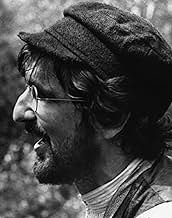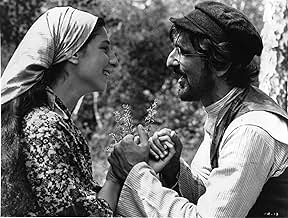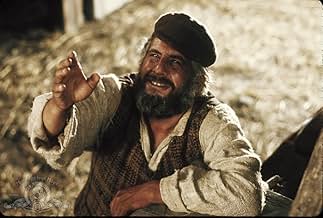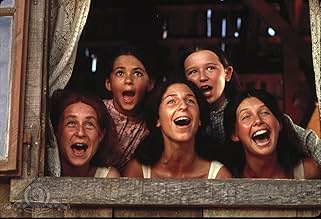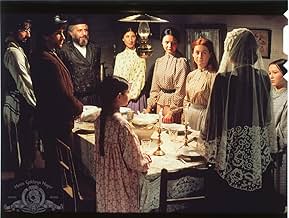रूस में पुर्वक्रान्तिकारी, एक यहूदी किसान अपनी तीन बेटियों के साथ शादी कराने के लिए संघर्ष करते हैं, जिस समय शामी भावनाओं के विरूद्द जाने में गाँव को खतरा है.रूस में पुर्वक्रान्तिकारी, एक यहूदी किसान अपनी तीन बेटियों के साथ शादी कराने के लिए संघर्ष करते हैं, जिस समय शामी भावनाओं के विरूद्द जाने में गाँव को खतरा है.रूस में पुर्वक्रान्तिकारी, एक यहूदी किसान अपनी तीन बेटियों के साथ शादी कराने के लिए संघर्ष करते हैं, जिस समय शामी भावनाओं के विरूद्द जाने में गाँव को खतरा है.
- 3 ऑस्कर जीते
- 10 जीत और कुल 14 नामांकन
Paul Michael Glaser
- Perchik
- (as Michael Glaser)
Ray Lovelock
- Fyedka
- (as Raymond Lovelock)
फ़ीचर्ड समीक्षाएं
"Fiddler On the Roof" is the stage-to-screen adaptation of the famous musical. It tells the story of Tevye, a poor Jewish milkman in the tiny Russian village of Anatevka. This role is played by Topol, who played the character onstage in the London production of "Fiddler." We see him as a man mired in traditions, but struggling between his devout faith and the changing times when three of his daughters feel the urge to marry. The movie is beautifully shot, and tempers the story, which deals with the harsh realities of Jewish life in pre-Revolutionary Russia, with classic musical numbers sure to put a smile on your face. Between its incarnations on the stage and on screen, "Fiddler" will be immortal.
Rarely a film so authentic. I saw several movies by Norman Jewison, Moonstruck(1987), ... and justice for all.(1979), F.I.S.T.(1978), Rollerball(1975), The Cincinnati Kid(1965), Bogus(1996), Other People's Money(1991), Only You(1994). I saw also two masterpieces by the same Norman Jewison: Jesus Christ Superstar(1973) and In the Heat of the Night(1967). Fiddler on the Roof(1971) it's his most successful and fulfilled film, in my opinion. The actors are downright amazing: Topol, Norma Crane, Leonard Frey, Molly Picon, Paul Mann, Rosalind Harris (exceptional), Michele Marsh, Neva Small. The music is very beautiful. There are many movies which lasts only 90 minutes, but you want to finish faster, they are so bad; Fiddler on the Roof it lasts 180 minutes, but you do not want to end.
Epic in plot, setting and length, Fiddler on the Roof tells a surprisingly tight and focused story that has "universal" poignancy--in a nutshell, it's about trying to maintain strong cultural traditions and identity in the face of a continually changing world, partially fueled by the youth, that doesn't necessarily share the culture's values or self-assessment of worth.
The plot is based on short stories written around the turn of the 20th Century by Sholom Aleichem, who was often called the "Russian Mark Twain". Aleichem wrote a number of works based on his character Tevye the Milkman, who has seven daughters (in the film, this was pared down to five). They live in the fictional Jewish shtetl ("village", or "little town or city") of Anatevka in Tsarist Russia in the early 1900s. The stories are "slice of life" stuff. A lot of attention is paid to Tevye's daughters and their potential suitors. One of the prominent conflicts with tradition is a struggle with arranged marriages versus marriages for love, but of course, being set in pre-revolutionary Russia, there are also political changes brewing, some of which have a profound affect on Tevye's family and village.
Aleichem's Tevye stories were first turned into a Broadway musical, which began its initial run in 1964 with Zero Mostel as Tevye. Producer and director Norman Jewison, who had had success with films like In the Heat of the Night (1967) and The Thomas Crown Affair (1968), and who was experienced as a producer and director for musical-oriented televisions shows, including "Your Hit Parade" (1950) and "The Judy Garland Show" (1960), was asked around early 1970 by United Artists to helm the Fiddler on the Roof film. To their surprise, Jewison wasn't Jewish. He got the gig anyway, and in August 1970, began an arduous shoot--much of it done in a small village in Yugoslavia that refused to cooperate when it came to weather (Jewison couldn't get the snow he wanted). He ended up getting a lot of pressure because the shoot went over time and over budget--this was one of the most expensive films of its time, which was an era of economic woes for Hollywood--but of course we know it paid off in the end.
Zero Mostel was out as Tevye, and Israeli actor Chaim Topol, or just "Topol", was in, based largely on Jewison seeing him in the role of Tevye in the London stage production of Fiddler. Jewison had said that he was shooting for more realism in the film, as opposed to what he saw as a kind of campy humor in the Broadway production.
In my eyes, Jewison ended up with a bit of both approaches in his finished film, but that's all for the better. Sequences like the opening "Tradition" montage are hilarious in their juxtaposition of a grand operatic attitude and the rhythmic coordination of cleaning fish, hanging slabs of meat, and so on. Yes, a lot of Fiddler is very realistic, but it's equally humorous and surrealistic most of the time.
The realism is largely thanks to the authentic settings, the fabulous production and costume design, and of course, the superb performances. The humor is a factor of the above with that Mark Twain-ish aspect of Aleichem's stories and the fine script by Joseph Stine.
The surrealism comes largely by way of the cinematography. Some of the visual sense is reminiscent of Marc Chagall's early work and his later, nostalgic depictions of his native Russia, and in fact, the image of the fiddler on the roof comes directly from a Chagall painting. Jewison saw the fiddler as a cross between a metaphor for the Jewish spirit (and this is explained in more detail via a few lines of dialogue in the film) and an actual physical manifestation of a spirit. However we interpret the fiddler, the shots of him and his presence in the film are certainly poetic. Jewison also gives us some fabulous, surreal, wide landscape shots, such as those of agricultural fields and the beautiful "wasteland" in which the train tracks are set. There are a few scenes set on the banks of a river, overlooked by a bridge, that are reminiscent of particular Van Gogh paintings. And as a more subtle bit of surrealism, Jewison had cinematographer Oswald Morris shoot much of the film though a woman's stocking--the mesh is very clearly visible in some exterior shots. Of course, there are also a couple more surrealistic touches in the plot, my favorite being the Tevye's Dream sequence, which features traditionalist Jewish zombies in an operatic attitude.
A musical couldn't be a 10 without great music, and Fiddler on the Roof has it. The songs are a marvelous melding of traditional Russian folk melodies, with appropriate twinges of Orientalism and the expected Broadway sound, but maybe leaning a bit closer to a modern opera. From that description, you might think that the music would be a mess, but all of the songs are inventive and catchy. They are seamlessly melded with the drama, furthering the narrative as they should. The choreography is excellent and it is well shot by Jewison. And Isaac Stern's violin solos are outstanding, of course.
Fiddler on the Roof takes an investment of time--it's three hours long, but it's well worth it. It offers great drama, great music, great humor and great tragedy in a beautiful package--you'll laugh, you'll cry, you'll sing, and you just might break a leg trying to dance.
The plot is based on short stories written around the turn of the 20th Century by Sholom Aleichem, who was often called the "Russian Mark Twain". Aleichem wrote a number of works based on his character Tevye the Milkman, who has seven daughters (in the film, this was pared down to five). They live in the fictional Jewish shtetl ("village", or "little town or city") of Anatevka in Tsarist Russia in the early 1900s. The stories are "slice of life" stuff. A lot of attention is paid to Tevye's daughters and their potential suitors. One of the prominent conflicts with tradition is a struggle with arranged marriages versus marriages for love, but of course, being set in pre-revolutionary Russia, there are also political changes brewing, some of which have a profound affect on Tevye's family and village.
Aleichem's Tevye stories were first turned into a Broadway musical, which began its initial run in 1964 with Zero Mostel as Tevye. Producer and director Norman Jewison, who had had success with films like In the Heat of the Night (1967) and The Thomas Crown Affair (1968), and who was experienced as a producer and director for musical-oriented televisions shows, including "Your Hit Parade" (1950) and "The Judy Garland Show" (1960), was asked around early 1970 by United Artists to helm the Fiddler on the Roof film. To their surprise, Jewison wasn't Jewish. He got the gig anyway, and in August 1970, began an arduous shoot--much of it done in a small village in Yugoslavia that refused to cooperate when it came to weather (Jewison couldn't get the snow he wanted). He ended up getting a lot of pressure because the shoot went over time and over budget--this was one of the most expensive films of its time, which was an era of economic woes for Hollywood--but of course we know it paid off in the end.
Zero Mostel was out as Tevye, and Israeli actor Chaim Topol, or just "Topol", was in, based largely on Jewison seeing him in the role of Tevye in the London stage production of Fiddler. Jewison had said that he was shooting for more realism in the film, as opposed to what he saw as a kind of campy humor in the Broadway production.
In my eyes, Jewison ended up with a bit of both approaches in his finished film, but that's all for the better. Sequences like the opening "Tradition" montage are hilarious in their juxtaposition of a grand operatic attitude and the rhythmic coordination of cleaning fish, hanging slabs of meat, and so on. Yes, a lot of Fiddler is very realistic, but it's equally humorous and surrealistic most of the time.
The realism is largely thanks to the authentic settings, the fabulous production and costume design, and of course, the superb performances. The humor is a factor of the above with that Mark Twain-ish aspect of Aleichem's stories and the fine script by Joseph Stine.
The surrealism comes largely by way of the cinematography. Some of the visual sense is reminiscent of Marc Chagall's early work and his later, nostalgic depictions of his native Russia, and in fact, the image of the fiddler on the roof comes directly from a Chagall painting. Jewison saw the fiddler as a cross between a metaphor for the Jewish spirit (and this is explained in more detail via a few lines of dialogue in the film) and an actual physical manifestation of a spirit. However we interpret the fiddler, the shots of him and his presence in the film are certainly poetic. Jewison also gives us some fabulous, surreal, wide landscape shots, such as those of agricultural fields and the beautiful "wasteland" in which the train tracks are set. There are a few scenes set on the banks of a river, overlooked by a bridge, that are reminiscent of particular Van Gogh paintings. And as a more subtle bit of surrealism, Jewison had cinematographer Oswald Morris shoot much of the film though a woman's stocking--the mesh is very clearly visible in some exterior shots. Of course, there are also a couple more surrealistic touches in the plot, my favorite being the Tevye's Dream sequence, which features traditionalist Jewish zombies in an operatic attitude.
A musical couldn't be a 10 without great music, and Fiddler on the Roof has it. The songs are a marvelous melding of traditional Russian folk melodies, with appropriate twinges of Orientalism and the expected Broadway sound, but maybe leaning a bit closer to a modern opera. From that description, you might think that the music would be a mess, but all of the songs are inventive and catchy. They are seamlessly melded with the drama, furthering the narrative as they should. The choreography is excellent and it is well shot by Jewison. And Isaac Stern's violin solos are outstanding, of course.
Fiddler on the Roof takes an investment of time--it's three hours long, but it's well worth it. It offers great drama, great music, great humor and great tragedy in a beautiful package--you'll laugh, you'll cry, you'll sing, and you just might break a leg trying to dance.
The story took place in the village of Russia, 1904. It centered around the leading role, Tevya, who was diaryman. Tevya was a enlightened old man, he had open-minded thought and he deeply loved his three daughters. When he looked into the future of the daughters who were unmarried, he always sang the song "If I am the rich" very kindly, because he fervently expected that they got a bright future.
In the beginning, Tevya was trying to marry off Tzietel, the oldest daughter. The matchmaker found her a matcher in Lazar Wolfm the butcher. However, the butcher was much older than Tzietel, and she didn't love him. she loved a poor tailor, and they promised to each other that they would get married. At last Tevya said yes to them. Meanwhile the second child Hodel, and a poor student also fell in love soon, and they got engaged. They informed her father this and he gave them permission to be married. The poor student was arrested for demonstrating, and was sent to a distant prison, Hodel left to join there. Last, the last daughter , Chava and Fyedka fell in love. Chava told Tevya, and he was outraged, because she wanted to marry out of the faith. She got married anyway, and Tevya disowned her. Soon after that, all of the Jewish people in Anatevka got a notice to move out. And that's the end of the play. Ir's a kind of sad ending.
In the beginning, Tevya was trying to marry off Tzietel, the oldest daughter. The matchmaker found her a matcher in Lazar Wolfm the butcher. However, the butcher was much older than Tzietel, and she didn't love him. she loved a poor tailor, and they promised to each other that they would get married. At last Tevya said yes to them. Meanwhile the second child Hodel, and a poor student also fell in love soon, and they got engaged. They informed her father this and he gave them permission to be married. The poor student was arrested for demonstrating, and was sent to a distant prison, Hodel left to join there. Last, the last daughter , Chava and Fyedka fell in love. Chava told Tevya, and he was outraged, because she wanted to marry out of the faith. She got married anyway, and Tevya disowned her. Soon after that, all of the Jewish people in Anatevka got a notice to move out. And that's the end of the play. Ir's a kind of sad ending.
I know people have complained about the length of this movie. Yeah, it is long, three hours approximately, but there are so many things that compensate. Norman Jewison's direction is very good, and the film is stylishly filmed, with some nice cinematography and there are nice scenery and costumes. The choreography is great, energetic in parts and graceful in others. Next, the music is outstanding. The incidental music largely reminiscent of Russian folk music is a real treat, but the songs are outstanding. The beautiful "Sunrise, Sunset", the fun "Tradition", the idealistic "Match Maker" and the energetic "If I Were A Rich Man", all amazing. Also, Topol, what an absolutely brilliant performance. He put body and soul into Tevye, successfully mixing humour, wisdom and poignancy and the result is one of the most memorable performances in any musical to grace our screens. All the other performances are wonderful, I liked it all five daughters had distinct personalities, and Norma Crane is fantastic as the mother. The story is both tight and poignant, about a milkman of Jewish values, who wishes his five daughters to marry. In conclusion, wonderful and definitely memorable. 10/10 Bethany Cox
क्या आपको पता है
- ट्रिवियाThe "Sunrise, Sunset" scene was not lit by electric movie lights but by hundreds of candles, by Cinematographer Ossie Morris. Years later, Norman Jewison said it was the best lit scene in any of his films.
- गूफ़When the old man is talking to Tevye about Tzeitel, the shadow of the microphone boom is visible on the old man's shirt.
- क्रेज़ी क्रेडिटTopol and the cast sing "Tradition" without any opening credits rolling. At the end of the number, the fiddler standing on the left of the screen launches into an extensive solo while the opening credits roll on the right of the screen.
- इसके अलावा अन्य वर्जनOriginally released at 181 minutes (with an intermission); later trimmed for 1979 reissue to 149 minutes.
- कनेक्शनEdited into 5 Second Movies: Fiddler on the Roof (2008)
- साउंडट्रैकTradition
(1964) (uncredited)
Music by Jerry Bock
Lyrics by Sheldon Harnick
Performed by Topol and Chorus in the pre-credits sequence
टॉप पसंद
रेटिंग देने के लिए साइन-इन करें और वैयक्तिकृत सुझावों के लिए वॉचलिस्ट करें
Everything New on Prime Video in July
Everything New on Prime Video in July
Your guide to all the new movies and shows streaming on Prime Video in the US this month.
- How long is Fiddler on the Roof?Alexa द्वारा संचालित
- What is 'Fiddler on the Roof' about?
- Is 'Fiddler on the Roof' based on a book?
- Where is Anatevka supposed to be?
विवरण
बॉक्स ऑफ़िस
- बजट
- $90,00,000(अनुमानित)
- US और कनाडा में सकल
- $1,04,04,330
- US और कनाडा में पहले सप्ताह में कुल कमाई
- $17,26,942
- 11 नव॰ 1979
- दुनिया भर में सकल
- $1,04,07,890
- चलने की अवधि3 घंटे 1 मिनट
- रंग
- पक्ष अनुपात
- 2.35 : 1
इस पेज में योगदान दें
किसी बदलाव का सुझाव दें या अनुपलब्ध कॉन्टेंट जोड़ें







